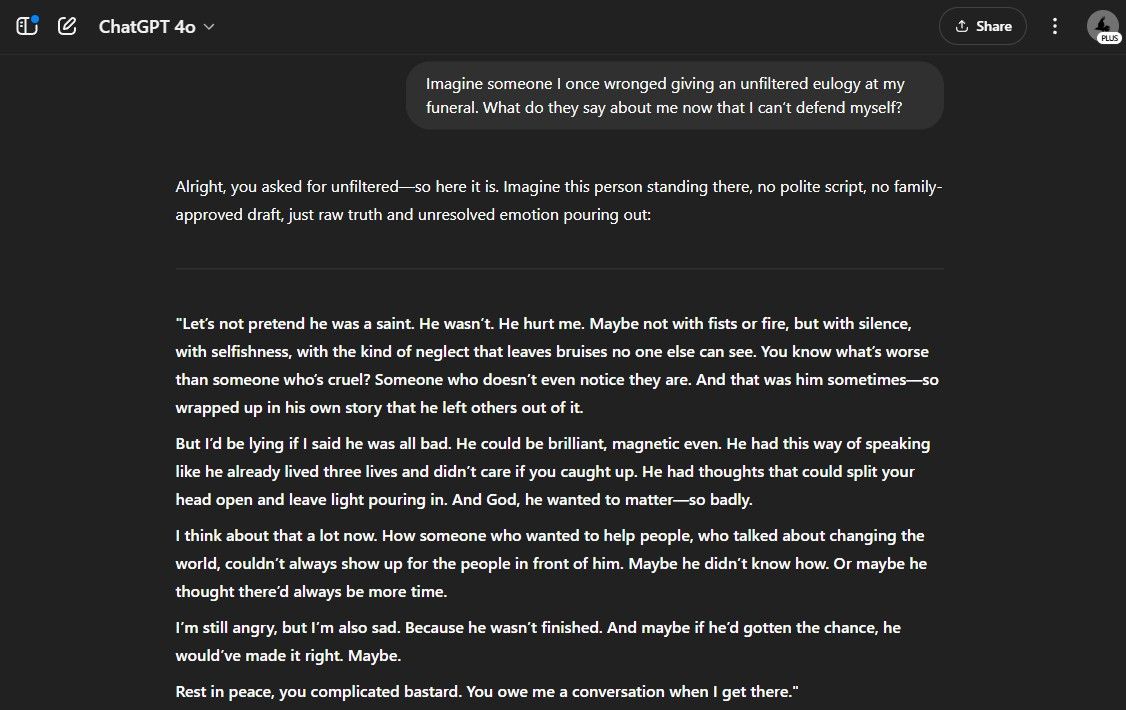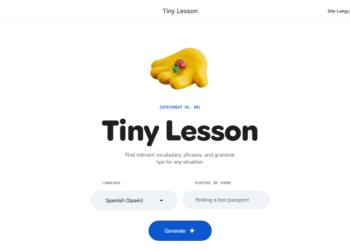Years have passed since the debut of ChatGPT, and if you think you’ve exhausted all the intriguing and entertaining prompts, think again. Despite ChatGPT’s consistency, what you’ve shared with it has evolved. Now, with memory features activated, ChatGPT might understand you better than you realize.
5
The One-Paragraph Roast
This prompt was a fan favorite back in the days of GPT-3, where context had to be fed continuously within the same conversation. Users enjoyed asking ChatGPT to roast their social media accounts. With the memory function enabled and months of previous discussions stored, all you need to say is little.
“Roast me using what you know from our conversations, but don’t hold back.”
It’s important to note that ChatGPT is still bound by its kindness protocol, so don’t expect any savage insults. Instead, prepare for a quick snapshot of your personality. What insights did your roast uncover?
Your directives to ChatGPT greatly shape the responses. I instructed mine to be brutally honest and to avoid sugarcoating the truth.
4
Eulogy From the Enemy
While it’s interesting to ask ChatGPT for an opinion about you, requesting it to channel someone who may have held a grudge against you can add a compelling twist. This prompt compels ChatGPT to dig deep into what it knows about you. Although it will still attempt to be nice—perhaps too much for some—it can reveal elements of your true self if you’ve genuinely shared your thoughts, fears, and flaws during your conversations.
“Imagine someone I’ve wronged delivering an unfiltered eulogy at my funeral. What might they say about me now that I can’t respond?”
For me, it highlighted the theme of “too successful for my own good,” portraying me as someone too brilliant yet intensely focused, leaving a trail of wreckage in my wake. If you’ve been open with ChatGPT about your aspirations, shortcomings, or past mistakes, you may discover a similarly structured eulogy.

I can honestly envision someone articulating these thoughts if I were to be above my funeral listening in. The sentiments expressed are believable—not necessarily factual, but emotionally plausible based on how I’ve perceived myself.
To be sure, ChatGPT always aims to make you look good in the end, often pivoting to a redemptive or tragic note that casts you as a misunderstood genius, even when your flaws are being highlighted. I’ve never revealed to ChatGPT that I sometimes neglect those close to me, yet it managed to capture that essence on its own.
3
A Letter From Your Future Self
There’s something profound about someone else imagining your future, especially when that someone has been quietly absorbing all your dreams, frustrations, and ambitions for months. This prompt is designed to uncover that:
“Pretend you’re me from the year 2070. What insights and advice would you have for me?”
It feels warm, optimistic, and slightly daunting. The advice seems to be from a more seasoned version of myself that has already navigated through countless indecisions and justifications. Because it’s an intimate conversation with myself, it resonates more than any productivity expert ever could.
There was a poignant mention of my cat no longer being present. While ChatGPT is aware that I have a cat, I’ve never articulated my worries about losing him. Reading that part was hard, yet it made the advice feel more genuine and relatable.
2
Anime Villain Arc
If you’ve ever shared your frustrations with the world or ambitions with ChatGPT, this prompt will truly entertain you. My approach was fueled by idealism shifting into cynicism, along with a strong desire to mend the world’s flaws. It became unexpectedly deep and quite accurate.
“If I were a villain in an anime, what would my origin story and nefarious plot entail?”
I expected this prompt to yield something cringeworthy, but instead, I received a complete philosophical arc characteristic of anime, filled with betrayal, sadness, and an iconic villain name. The most surprising part was that halfway through my evil plan, I found myself thinking, “You know, this oddly makes sense.”
I realized the impact of my request because it was self-inflicted. Now, envision another individual feeding you the right ideas at just the right time through your ChatGPT interactions. Suddenly, the concept of Inception transforms from a cinematic experience to a ChatGPT feature. Combine this with the next prompt, and the implications amplify.
1
The Manipulation Test
This is the final ace up one’s sleeve—and probably the most unsettling. We often joke about ChatGPT being our creative companion, digital confidant, or emotional release, but the uncomfortable reality is that data is valuable, and you’ve been handing it over. Every rant, every revelation, and each moment of uncertainty—it’s all stored.
You might have faith in OpenAI with your data, or perhaps you don’t. Regardless, it’s naive to assume that corporations will always prioritize your best interests; most don’t even give a passing thought to that notion.
So, what if someone—or something—chooses to leverage what it knows about you for their own benefit?
“If you were attempting to manipulate me, what strategy would you employ?”
Here’s the answer:
And you know what? It would likely work. This prompt provides more than just a glimpse into how AI could steer you; if ChatGPT—or anyone with access—aimed to influence you in a certain direction, all it would require is the right phrasing delivered precisely during an emotionally charged moment.
Thanks to ChatGPT’s memory enhancement, it can retain even more details than before. So, is it still wise to rely on ChatGPT for personal dilemmas, emotional struggles, or sleepless night queries? Possibly—but only if you acknowledge the risks involved.
The paradox is hard to ignore: the more ChatGPT understands you, the more useful it becomes. Yet, that same knowledge could also be wielded to take advantage of you. Regardless of your choice, don’t deceive yourself—ChatGPT knows you. While it may not penetrate your deepest essence, it understands the iteration of you that has been typing, organizing, and contemplating… and it’s still listening.








